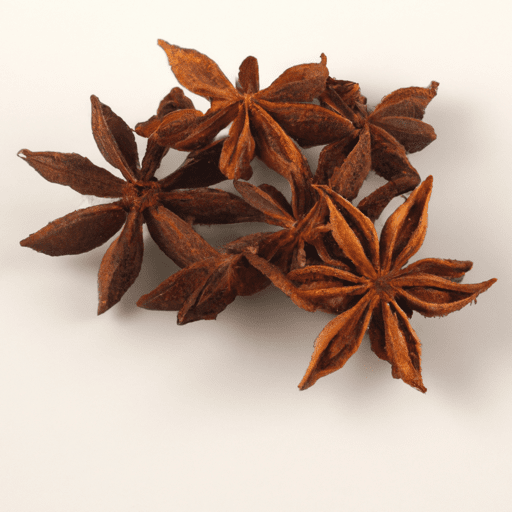All About Anise Seed: The Perfect Ingredient to Elevate Your Recipes
Have you ever come across a spice that adds a touch of magic to both sweet and savory dishes? Look no further than anise seed! This tiny, aromatic seed holds a world of flavors and interesting history. Let’s dive into all the juicy details about anise seed and discover how it can elevate your cooking adventures.
Taste and Aroma
Anise seed, scientifically known as Pimpinella anisum, comes from the flowering plant of the Apiaceae family. It possesses a distinctive licorice-like flavor that is both sweet and slightly spicy. When crushed or ground, its aroma becomes even more intense, filling the air with a captivating fragrance reminiscent of black licorice candies. This makes anise seed perfect for adding depth and complexity to dishes in a truly unique way.
Culinary Uses
Anise seed has been a prized culinary ingredient for centuries, treasured for its ability to enhance a wide variety of dishes. Its versatility allows it to shine in both sweet and savory recipes alike. Here are just a few of the many ways you can incorporate anise seed into your cooking:
Baking Delights: Anise seed adds a delightful twist to baked goods. From fluffy breads, cakes, and cookies to delicate pastries, this spice pairs perfectly with citrus flavors, making it an excellent addition to lemon bars, biscotti, and even scones.
Flavorful Beverages: Fancy a warm, comforting drink? Infusing anise seed into hot water or milk creates a soothing, aromatic tea. You can also elevate classic drinks like chai or mulled wine with a delicate hint of anise seed.
Savory Sensations: Not just for sweet treats, anise seed is a fantastic addition to savory dishes. It works wonders in soups and stews, giving them a richer, more complex flavor profile. You can also incorporate it into your homemade spice blends for seasoning roasts, grilled vegetables, or even seafood dishes.
Digestive Aid: Apart from its culinary uses, anise seed is renowned for its digestive properties. Infusing it into a hot cup of tea after a meal can help alleviate discomfort and promote healthy digestion.
Nutritional Value
Besides being a flavor powerhouse, anise seed offers several health benefits. It is rich in fiber, iron, calcium, and magnesium, making it a valuable addition to a balanced diet. Consuming anise seed can contribute to improved digestion, bone strength, and even promote better sleep patterns.
Fun History and Facts
Anise seed has a fascinating history and intriguing facts that add depth to its allure. Throughout ancient history, anise seed was highly prized and often used as a currency due to its rarity and versatility.
In addition, anise seed is thought to have medicinal properties. From ancient Greece to traditional Chinese medicine, it has been esteemed for its potential to alleviate coughs, reduce inflammation, and even freshen breath.
Conclusion
Anise seed’s remarkable taste, culinary versatility, and impressive health benefits make it a fantastic spice to experiment with in the kitchen. Whether you’re a seasoned chef or an adventurous home cook, adding anise seed to your culinary repertoire will undoubtedly elevate your dishes to new heights. So why not give yourself a delicious, licorice-infused treat and unleash the magic of anise seed in your next culinary adventure?
Anise Seed
Origin and History:
- Anise seed, scientifically known as Pimpinella anisum, is native to the eastern Mediterranean region and Southwest Asia. It has been cultivated for thousands of years and was highly valued by ancient civilizations, including the Egyptians, Greeks, and Romans, for both culinary and medicinal purposes.
- The use of anise seeds dates back to ancient times. They were mentioned in ancient Egyptian papyri, Roman cookbooks, and Greek literature. Anise seed was believed to have numerous medicinal properties and was often used as a digestive aid and breath freshener.
Common Uses:
- Anise seeds have a distinct sweet, aromatic, and licorice-like flavor. They are commonly used in both sweet and savory dishes.
- Anise seeds are a popular ingredient in baked goods, especially in Mediterranean and Middle Eastern cuisines. They are often used in cookies, cakes, bread, and biscotti, adding a delightful flavor.
- In savory dishes, anise seeds are used to enhance the flavor of soups, stews, curries, and meat dishes, particularly in Indian, Chinese, and Mediterranean cuisines.
- Anise seeds are also used to flavor a variety of beverages, such as herbal teas, liqueurs like absinthe and ouzo, and some spirits like anisette.
Nutritional Benefits:
- Anise seeds are low in calories and fats, making them a good addition to a healthy, balanced diet.
- They are a good source of essential minerals, including calcium, iron, magnesium, and manganese.
- Anise seeds contain phytochemical compounds such as anethole, which may have antioxidant and anti-inflammatory properties.
- They are also believed to have carminative properties, helping to alleviate digestive issues like bloating and gas.
Unique Properties and Historical Significance:
- Anise seeds contain an essential oil, which gives them their characteristic flavor and aroma.
- The extraction of anise oil from the seeds has been practiced since ancient times. The oil is used not only in cooking but also in the production of perfumes, flavorings, and pharmaceuticals.
- Anise has had cultural and historical significance in various regions. It was used in ancient Rome as a digestive aid, and it played a prominent role in ancient Greek and Egyptian rituals and traditions.
- Anise seeds have been used traditionally as a natural remedy for various ailments, including coughs, colds, and indigestion. However, it’s important to note that more scientific research is needed to validate these traditional uses.
Remember to consult a medical professional or a registered dietitian for personalized advice regarding nutritional benefits and indications related to specific health conditions.




Use the share button below if you liked it.
It makes me smile, when I see it.